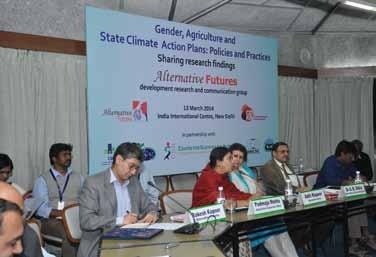
Description of the project: This evidence-based policy research project addressed the missing gender dimension in India’s State Action Plans on Climate Change (SAPCCs), working closely with the Central Environment Ministry and four State governments. India’s National Action Plan on Climate Change recognised in theory the differentiated climate change impacts on poor women but this was not addressed in the actual Plans. The project undertook policy analysis, gender budget analysis and field research on adaptive farming. Policy briefs and policy round-tables with State governments helped incorporate and institutionalise gender perspectives and actions into the SAPCCs and the Central Ministry‘s approval process.
Climate Impact: Project showed that compared to conventional agriculture, integrated, organic farming is more resilient to climate-induced disasters in the Indo-Gangetic flood plains of Uttar Pradesh, arid Deccan plateau in Andhra Pradesh and coastal Sunderbans in West Bengal. Integrated, organic agriculture withstands climate uncertainties better, with higher and more diverse farm-based productivity than conventional agriculture. Integrated, organic agriculture leads to better food security and more income for smallholder farmers – over 85% of India’s 600 million farm-based population – who rely on highly climate-sensitive farming practices. These results have strengthened state-level adoption of integrated, organic agriculture and especially understanding the role of gender in climate resilience.
Gender Impact: 1. The integral link between women and climate change adaptation was recognized in climate planning by the Central, State governments. 2. Succeeded in reflecting concerns of 87% of India’s working women living off climatesensitive smallholder farming. 3. Field research showed adaptive agriculture also puts more labour and time burden on women compared to men, which led grassroots groups, agriculture scientists to review organic farming from a gender lens. 4. Prepared UNDP’s Gender Mainstreaming Toolkit for state governments to implement SAPCCs; inclusion of climate change in the government’s High-level Committee’s Report on Status of Women to guide gender policy in future. 5. Contributed to India’s official submission on gender to the UNFCCC subsequent to the decision of the 18th Conference of Parties on advancing the gender balance goal.